Employee Retention Strategies in Hospitality Sector: A Report
VerifiedAdded on 2022/09/02
|10
|1712
|13
Report
AI Summary
This report examines the critical issue of employee retention within the global hospitality and tourism business. It highlights the negative correlation between organizational culture and employee turnover, emphasizing the impact of inadequate employee motivation. The report explores theoretical considerations, including the inverse relationship between competencies and value creation, and the need for cultural competence training and technological advancements. It investigates the challenges faced by managers in retaining staff, analyzing relevant theories such as Maslow's Hierarchy of Needs and the Human Capital Theory. The findings reveal that inadequate motivation, critical leadership issues, and the lack of self-esteem contribute to high employee turnover. The report concludes with recommendations for stress management, revised reward structures, and technological training to improve employee retention and overall business performance.
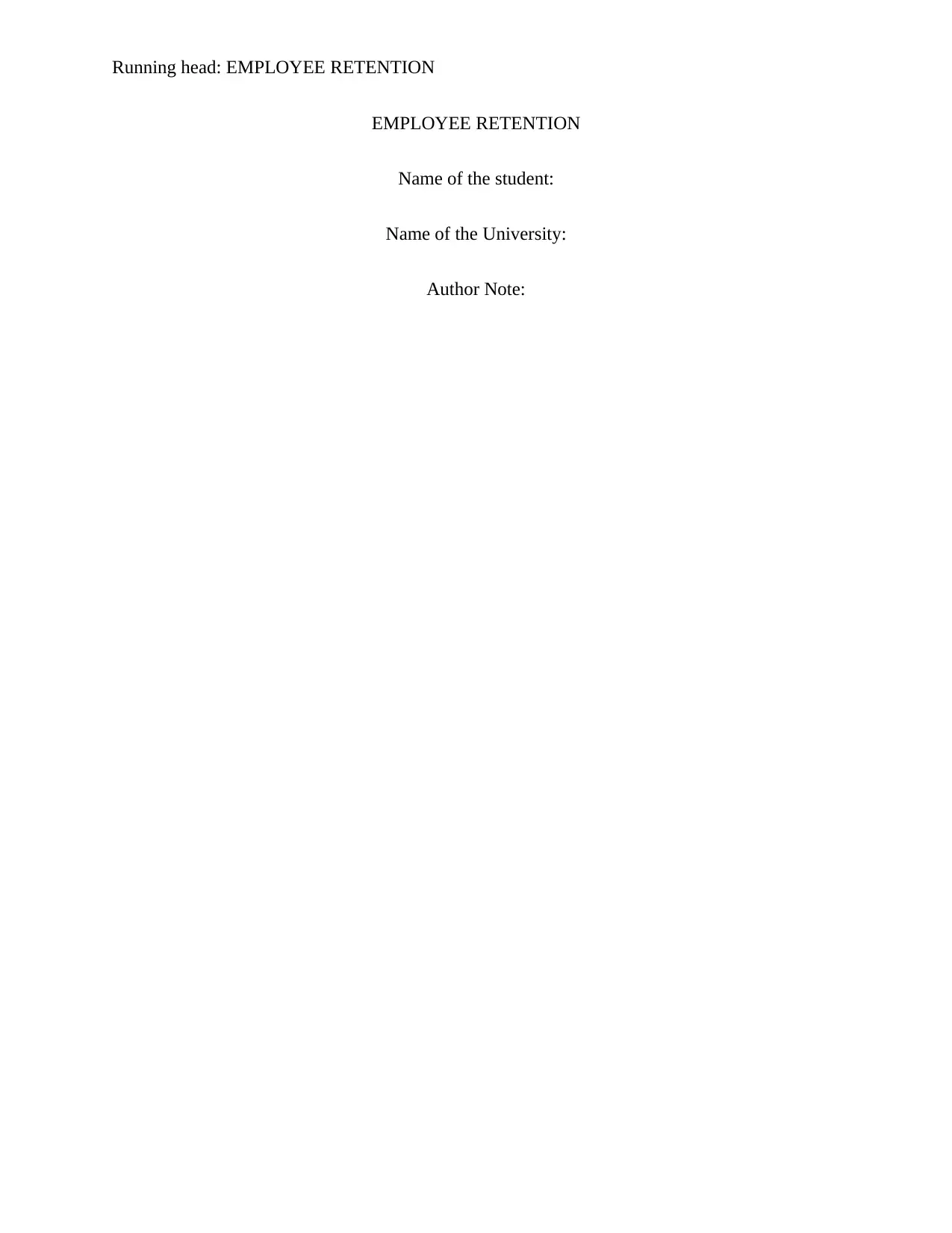
Running head: EMPLOYEE RETENTION
EMPLOYEE RETENTION
Name of the student:
Name of the University:
Author Note:
EMPLOYEE RETENTION
Name of the student:
Name of the University:
Author Note:
Paraphrase This Document
Need a fresh take? Get an instant paraphrase of this document with our AI Paraphraser
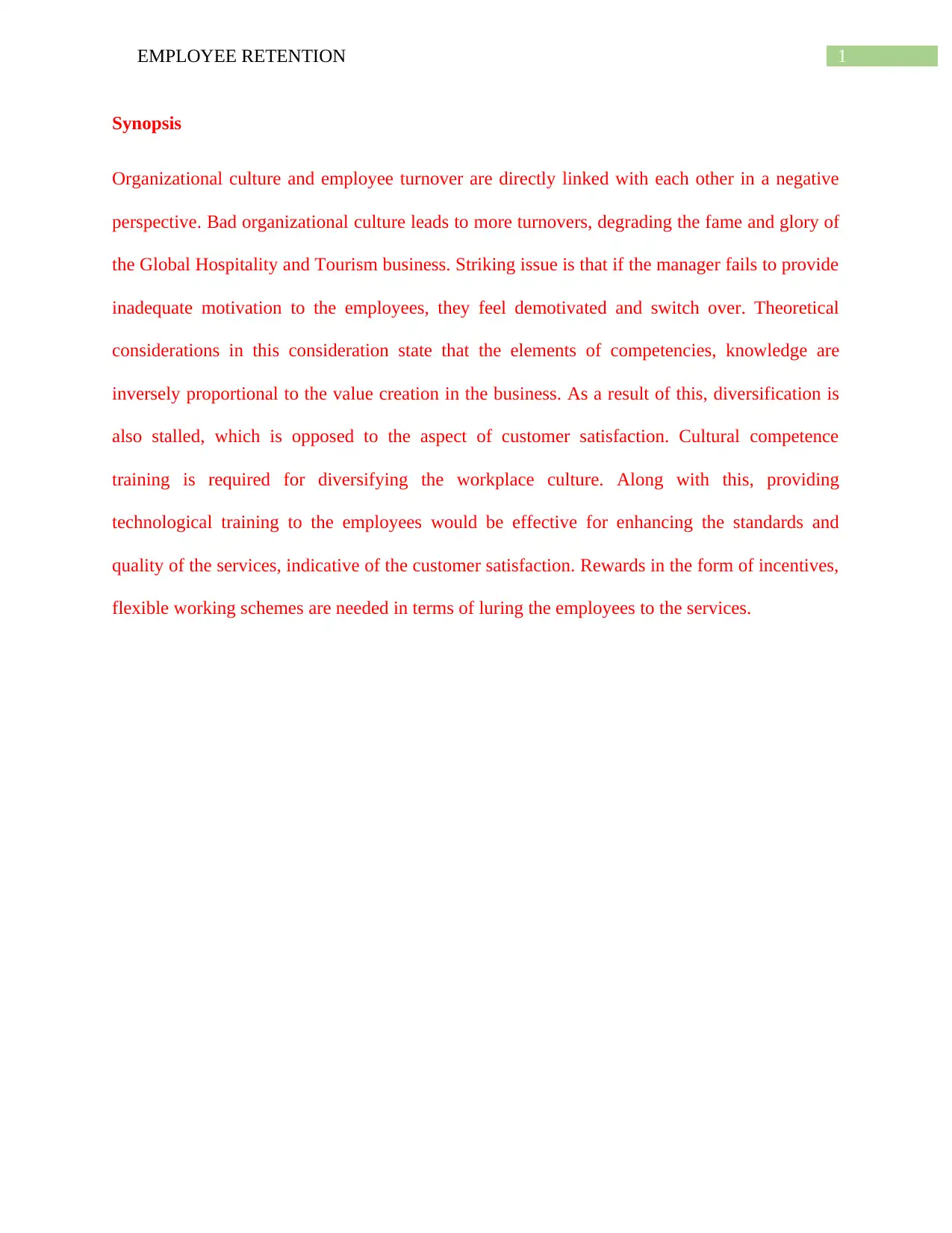
1EMPLOYEE RETENTION
Synopsis
Organizational culture and employee turnover are directly linked with each other in a negative
perspective. Bad organizational culture leads to more turnovers, degrading the fame and glory of
the Global Hospitality and Tourism business. Striking issue is that if the manager fails to provide
inadequate motivation to the employees, they feel demotivated and switch over. Theoretical
considerations in this consideration state that the elements of competencies, knowledge are
inversely proportional to the value creation in the business. As a result of this, diversification is
also stalled, which is opposed to the aspect of customer satisfaction. Cultural competence
training is required for diversifying the workplace culture. Along with this, providing
technological training to the employees would be effective for enhancing the standards and
quality of the services, indicative of the customer satisfaction. Rewards in the form of incentives,
flexible working schemes are needed in terms of luring the employees to the services.
Synopsis
Organizational culture and employee turnover are directly linked with each other in a negative
perspective. Bad organizational culture leads to more turnovers, degrading the fame and glory of
the Global Hospitality and Tourism business. Striking issue is that if the manager fails to provide
inadequate motivation to the employees, they feel demotivated and switch over. Theoretical
considerations in this consideration state that the elements of competencies, knowledge are
inversely proportional to the value creation in the business. As a result of this, diversification is
also stalled, which is opposed to the aspect of customer satisfaction. Cultural competence
training is required for diversifying the workplace culture. Along with this, providing
technological training to the employees would be effective for enhancing the standards and
quality of the services, indicative of the customer satisfaction. Rewards in the form of incentives,
flexible working schemes are needed in terms of luring the employees to the services.
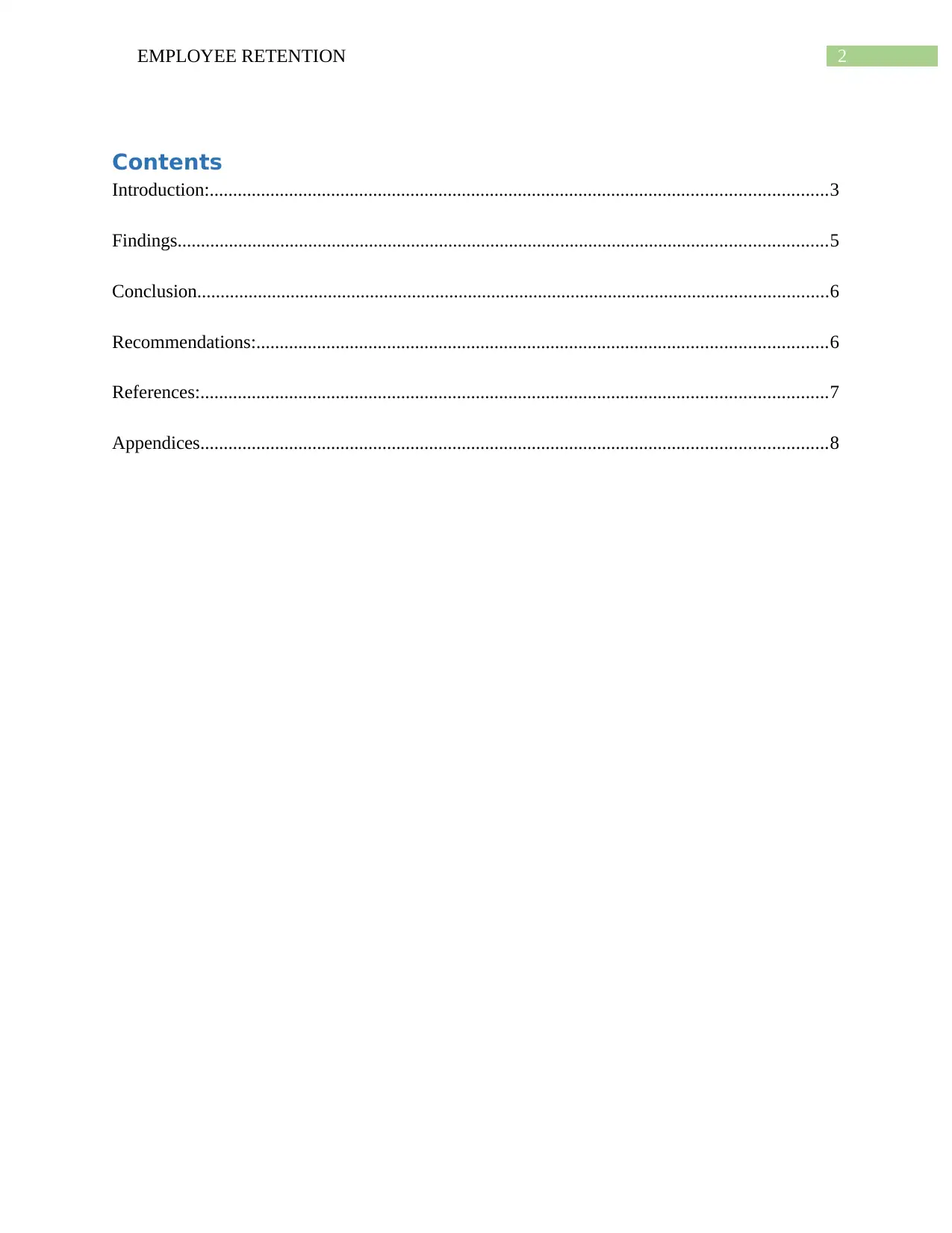
2EMPLOYEE RETENTION
Contents
Introduction:....................................................................................................................................3
Findings...........................................................................................................................................5
Conclusion.......................................................................................................................................6
Recommendations:..........................................................................................................................6
References:......................................................................................................................................7
Appendices......................................................................................................................................8
Contents
Introduction:....................................................................................................................................3
Findings...........................................................................................................................................5
Conclusion.......................................................................................................................................6
Recommendations:..........................................................................................................................6
References:......................................................................................................................................7
Appendices......................................................................................................................................8
⊘ This is a preview!⊘
Do you want full access?
Subscribe today to unlock all pages.

Trusted by 1+ million students worldwide
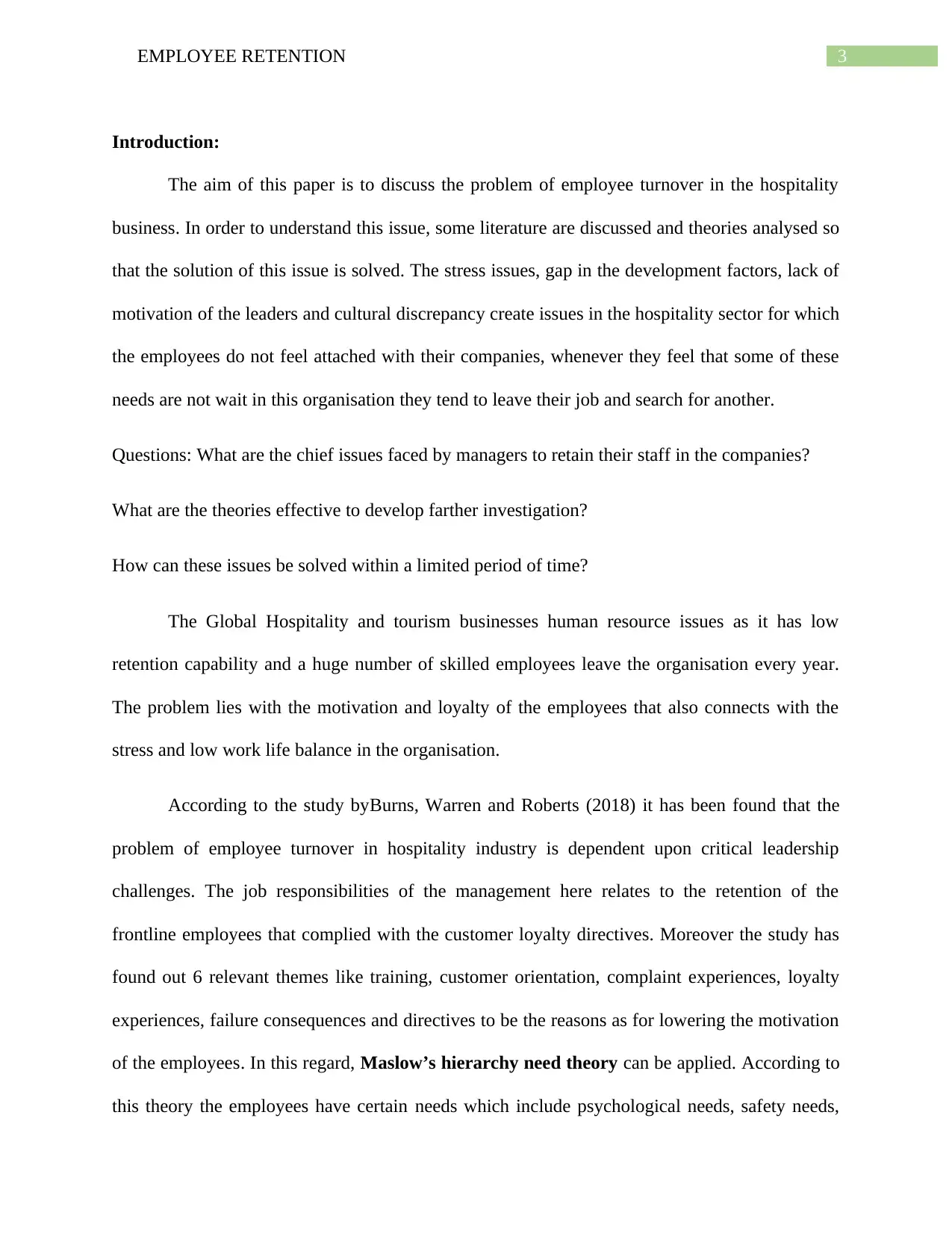
3EMPLOYEE RETENTION
Introduction:
The aim of this paper is to discuss the problem of employee turnover in the hospitality
business. In order to understand this issue, some literature are discussed and theories analysed so
that the solution of this issue is solved. The stress issues, gap in the development factors, lack of
motivation of the leaders and cultural discrepancy create issues in the hospitality sector for which
the employees do not feel attached with their companies, whenever they feel that some of these
needs are not wait in this organisation they tend to leave their job and search for another.
Questions: What are the chief issues faced by managers to retain their staff in the companies?
What are the theories effective to develop farther investigation?
How can these issues be solved within a limited period of time?
The Global Hospitality and tourism businesses human resource issues as it has low
retention capability and a huge number of skilled employees leave the organisation every year.
The problem lies with the motivation and loyalty of the employees that also connects with the
stress and low work life balance in the organisation.
According to the study byBurns, Warren and Roberts (2018) it has been found that the
problem of employee turnover in hospitality industry is dependent upon critical leadership
challenges. The job responsibilities of the management here relates to the retention of the
frontline employees that complied with the customer loyalty directives. Moreover the study has
found out 6 relevant themes like training, customer orientation, complaint experiences, loyalty
experiences, failure consequences and directives to be the reasons as for lowering the motivation
of the employees. In this regard, Maslow’s hierarchy need theory can be applied. According to
this theory the employees have certain needs which include psychological needs, safety needs,
Introduction:
The aim of this paper is to discuss the problem of employee turnover in the hospitality
business. In order to understand this issue, some literature are discussed and theories analysed so
that the solution of this issue is solved. The stress issues, gap in the development factors, lack of
motivation of the leaders and cultural discrepancy create issues in the hospitality sector for which
the employees do not feel attached with their companies, whenever they feel that some of these
needs are not wait in this organisation they tend to leave their job and search for another.
Questions: What are the chief issues faced by managers to retain their staff in the companies?
What are the theories effective to develop farther investigation?
How can these issues be solved within a limited period of time?
The Global Hospitality and tourism businesses human resource issues as it has low
retention capability and a huge number of skilled employees leave the organisation every year.
The problem lies with the motivation and loyalty of the employees that also connects with the
stress and low work life balance in the organisation.
According to the study byBurns, Warren and Roberts (2018) it has been found that the
problem of employee turnover in hospitality industry is dependent upon critical leadership
challenges. The job responsibilities of the management here relates to the retention of the
frontline employees that complied with the customer loyalty directives. Moreover the study has
found out 6 relevant themes like training, customer orientation, complaint experiences, loyalty
experiences, failure consequences and directives to be the reasons as for lowering the motivation
of the employees. In this regard, Maslow’s hierarchy need theory can be applied. According to
this theory the employees have certain needs which include psychological needs, safety needs,
Paraphrase This Document
Need a fresh take? Get an instant paraphrase of this document with our AI Paraphraser
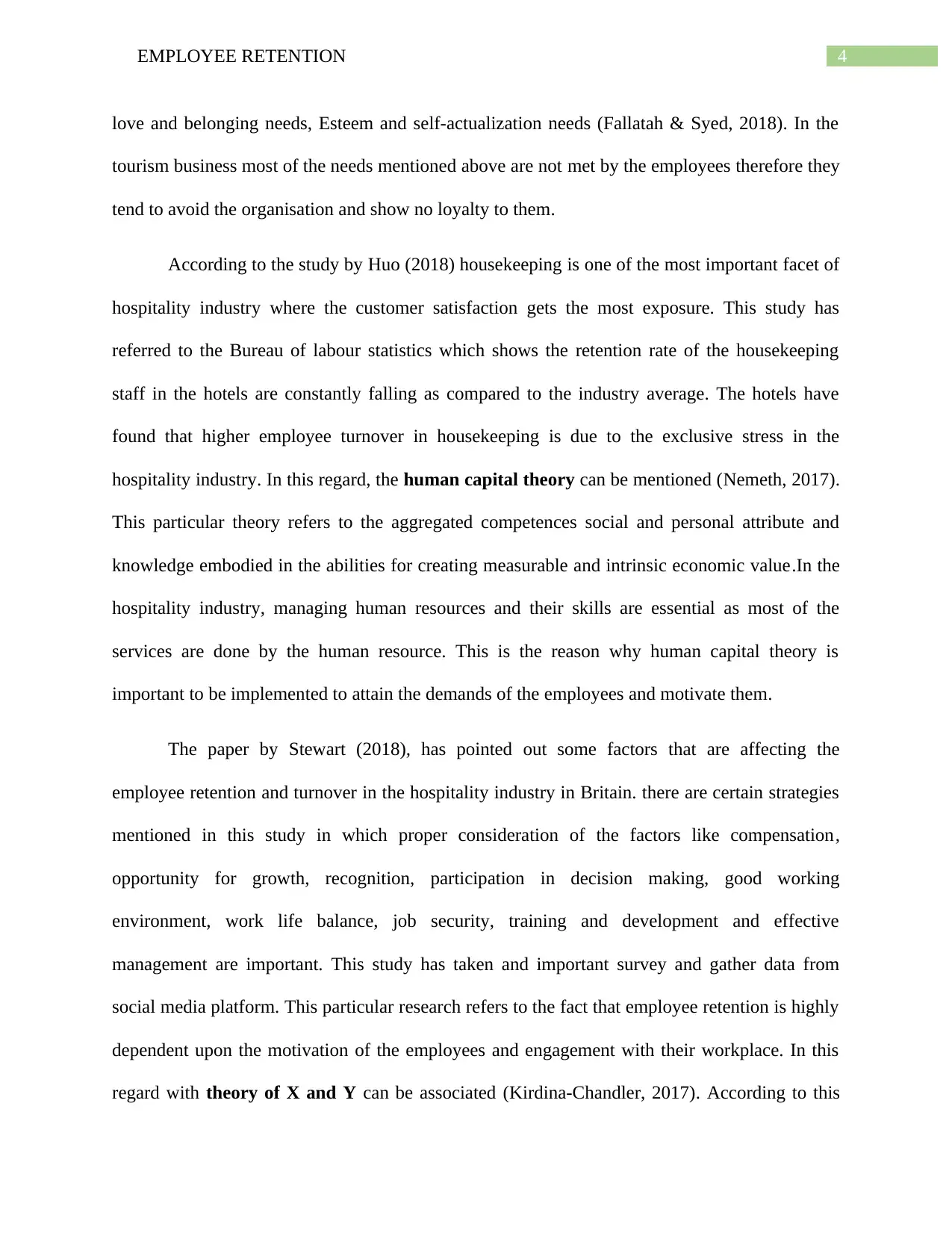
4EMPLOYEE RETENTION
love and belonging needs, Esteem and self-actualization needs (Fallatah & Syed, 2018). In the
tourism business most of the needs mentioned above are not met by the employees therefore they
tend to avoid the organisation and show no loyalty to them.
According to the study by Huo (2018) housekeeping is one of the most important facet of
hospitality industry where the customer satisfaction gets the most exposure. This study has
referred to the Bureau of labour statistics which shows the retention rate of the housekeeping
staff in the hotels are constantly falling as compared to the industry average. The hotels have
found that higher employee turnover in housekeeping is due to the exclusive stress in the
hospitality industry. In this regard, the human capital theory can be mentioned (Nemeth, 2017).
This particular theory refers to the aggregated competences social and personal attribute and
knowledge embodied in the abilities for creating measurable and intrinsic economic value.In the
hospitality industry, managing human resources and their skills are essential as most of the
services are done by the human resource. This is the reason why human capital theory is
important to be implemented to attain the demands of the employees and motivate them.
The paper by Stewart (2018), has pointed out some factors that are affecting the
employee retention and turnover in the hospitality industry in Britain. there are certain strategies
mentioned in this study in which proper consideration of the factors like compensation,
opportunity for growth, recognition, participation in decision making, good working
environment, work life balance, job security, training and development and effective
management are important. This study has taken and important survey and gather data from
social media platform. This particular research refers to the fact that employee retention is highly
dependent upon the motivation of the employees and engagement with their workplace. In this
regard with theory of X and Y can be associated (Kirdina-Chandler, 2017). According to this
love and belonging needs, Esteem and self-actualization needs (Fallatah & Syed, 2018). In the
tourism business most of the needs mentioned above are not met by the employees therefore they
tend to avoid the organisation and show no loyalty to them.
According to the study by Huo (2018) housekeeping is one of the most important facet of
hospitality industry where the customer satisfaction gets the most exposure. This study has
referred to the Bureau of labour statistics which shows the retention rate of the housekeeping
staff in the hotels are constantly falling as compared to the industry average. The hotels have
found that higher employee turnover in housekeeping is due to the exclusive stress in the
hospitality industry. In this regard, the human capital theory can be mentioned (Nemeth, 2017).
This particular theory refers to the aggregated competences social and personal attribute and
knowledge embodied in the abilities for creating measurable and intrinsic economic value.In the
hospitality industry, managing human resources and their skills are essential as most of the
services are done by the human resource. This is the reason why human capital theory is
important to be implemented to attain the demands of the employees and motivate them.
The paper by Stewart (2018), has pointed out some factors that are affecting the
employee retention and turnover in the hospitality industry in Britain. there are certain strategies
mentioned in this study in which proper consideration of the factors like compensation,
opportunity for growth, recognition, participation in decision making, good working
environment, work life balance, job security, training and development and effective
management are important. This study has taken and important survey and gather data from
social media platform. This particular research refers to the fact that employee retention is highly
dependent upon the motivation of the employees and engagement with their workplace. In this
regard with theory of X and Y can be associated (Kirdina-Chandler, 2017). According to this
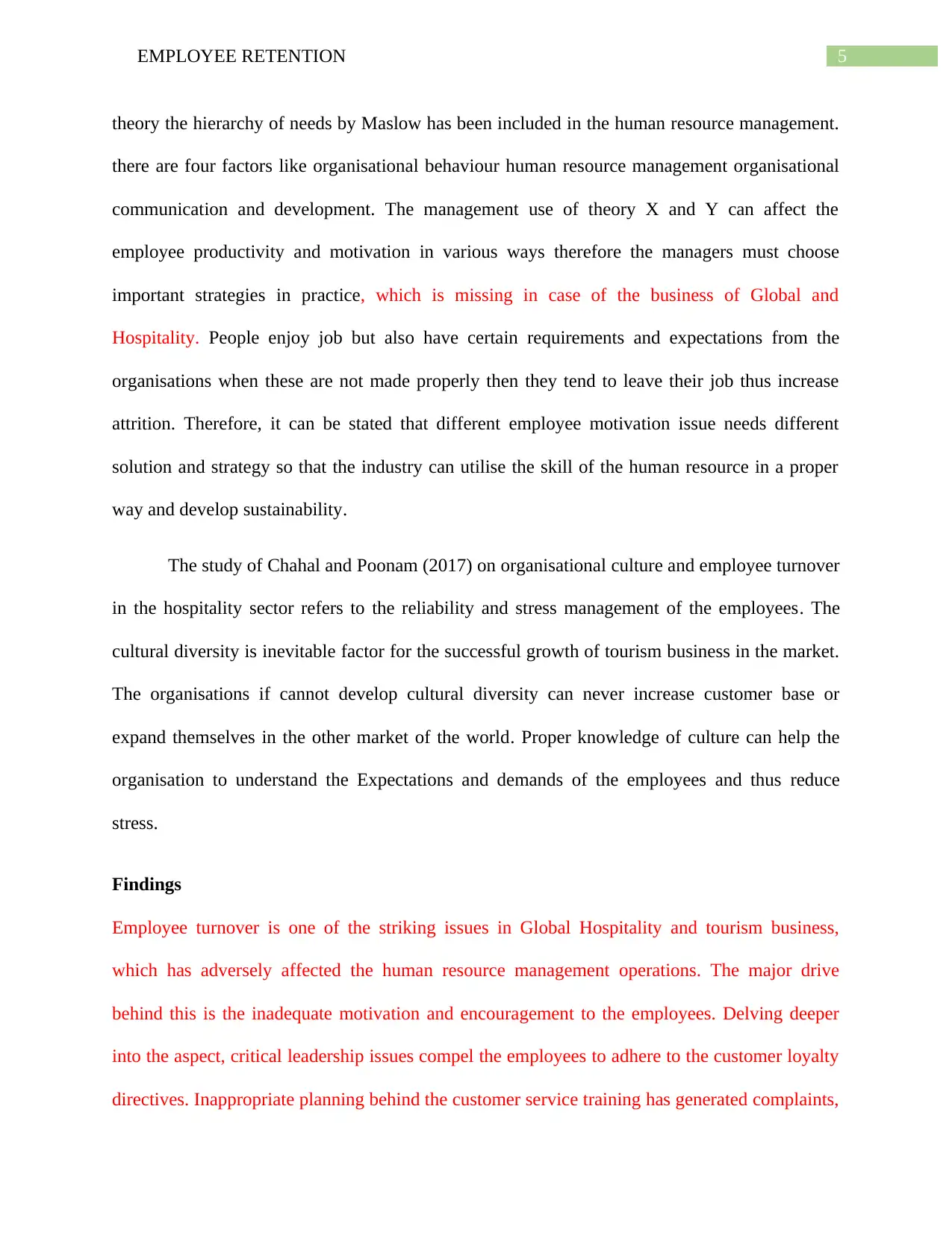
5EMPLOYEE RETENTION
theory the hierarchy of needs by Maslow has been included in the human resource management.
there are four factors like organisational behaviour human resource management organisational
communication and development. The management use of theory X and Y can affect the
employee productivity and motivation in various ways therefore the managers must choose
important strategies in practice, which is missing in case of the business of Global and
Hospitality. People enjoy job but also have certain requirements and expectations from the
organisations when these are not made properly then they tend to leave their job thus increase
attrition. Therefore, it can be stated that different employee motivation issue needs different
solution and strategy so that the industry can utilise the skill of the human resource in a proper
way and develop sustainability.
The study of Chahal and Poonam (2017) on organisational culture and employee turnover
in the hospitality sector refers to the reliability and stress management of the employees. The
cultural diversity is inevitable factor for the successful growth of tourism business in the market.
The organisations if cannot develop cultural diversity can never increase customer base or
expand themselves in the other market of the world. Proper knowledge of culture can help the
organisation to understand the Expectations and demands of the employees and thus reduce
stress.
Findings
Employee turnover is one of the striking issues in Global Hospitality and tourism business,
which has adversely affected the human resource management operations. The major drive
behind this is the inadequate motivation and encouragement to the employees. Delving deeper
into the aspect, critical leadership issues compel the employees to adhere to the customer loyalty
directives. Inappropriate planning behind the customer service training has generated complaints,
theory the hierarchy of needs by Maslow has been included in the human resource management.
there are four factors like organisational behaviour human resource management organisational
communication and development. The management use of theory X and Y can affect the
employee productivity and motivation in various ways therefore the managers must choose
important strategies in practice, which is missing in case of the business of Global and
Hospitality. People enjoy job but also have certain requirements and expectations from the
organisations when these are not made properly then they tend to leave their job thus increase
attrition. Therefore, it can be stated that different employee motivation issue needs different
solution and strategy so that the industry can utilise the skill of the human resource in a proper
way and develop sustainability.
The study of Chahal and Poonam (2017) on organisational culture and employee turnover
in the hospitality sector refers to the reliability and stress management of the employees. The
cultural diversity is inevitable factor for the successful growth of tourism business in the market.
The organisations if cannot develop cultural diversity can never increase customer base or
expand themselves in the other market of the world. Proper knowledge of culture can help the
organisation to understand the Expectations and demands of the employees and thus reduce
stress.
Findings
Employee turnover is one of the striking issues in Global Hospitality and tourism business,
which has adversely affected the human resource management operations. The major drive
behind this is the inadequate motivation and encouragement to the employees. Delving deeper
into the aspect, critical leadership issues compel the employees to adhere to the customer loyalty
directives. Inappropriate planning behind the customer service training has generated complaints,
⊘ This is a preview!⊘
Do you want full access?
Subscribe today to unlock all pages.

Trusted by 1+ million students worldwide
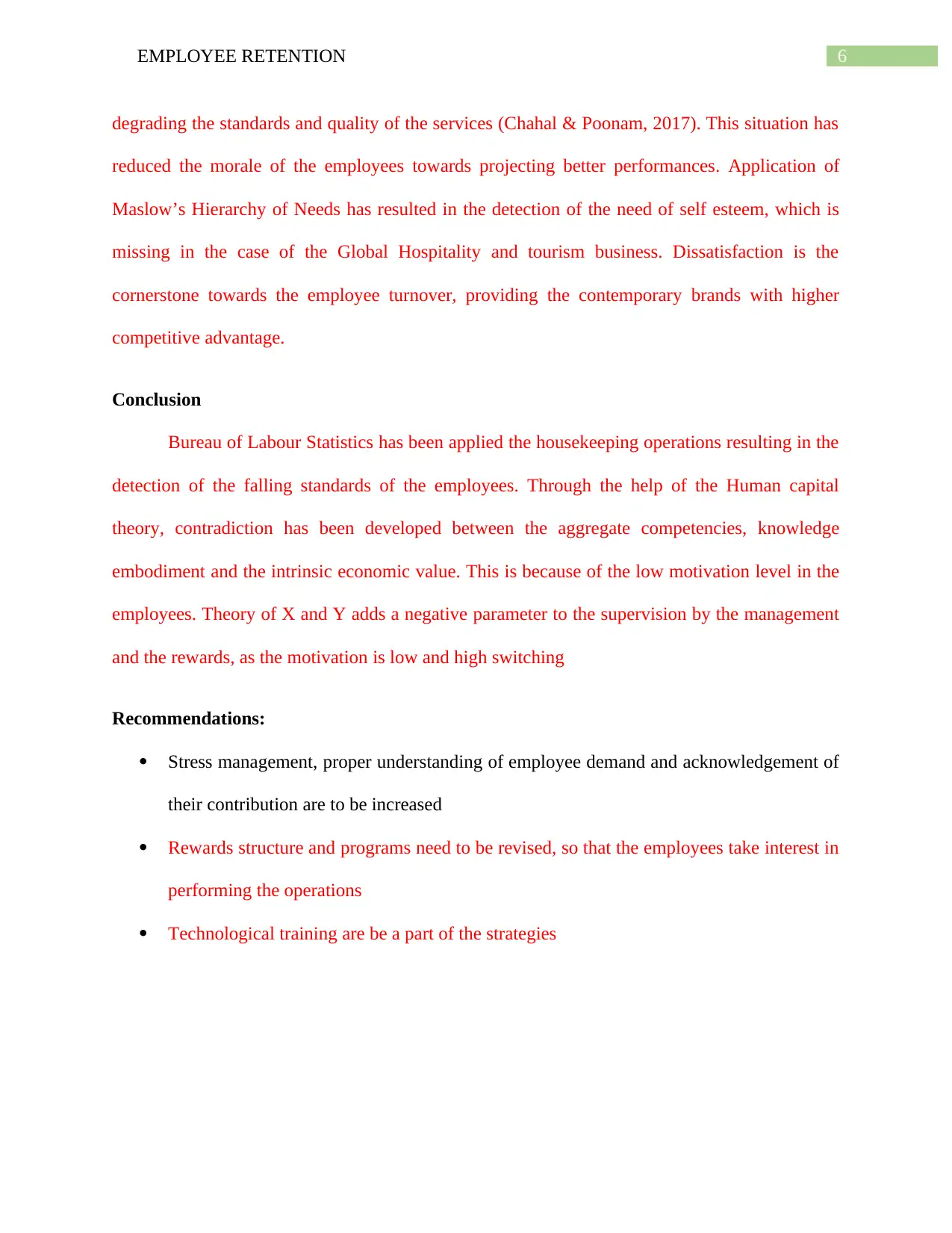
6EMPLOYEE RETENTION
degrading the standards and quality of the services (Chahal & Poonam, 2017). This situation has
reduced the morale of the employees towards projecting better performances. Application of
Maslow’s Hierarchy of Needs has resulted in the detection of the need of self esteem, which is
missing in the case of the Global Hospitality and tourism business. Dissatisfaction is the
cornerstone towards the employee turnover, providing the contemporary brands with higher
competitive advantage.
Conclusion
Bureau of Labour Statistics has been applied the housekeeping operations resulting in the
detection of the falling standards of the employees. Through the help of the Human capital
theory, contradiction has been developed between the aggregate competencies, knowledge
embodiment and the intrinsic economic value. This is because of the low motivation level in the
employees. Theory of X and Y adds a negative parameter to the supervision by the management
and the rewards, as the motivation is low and high switching
Recommendations:
Stress management, proper understanding of employee demand and acknowledgement of
their contribution are to be increased
Rewards structure and programs need to be revised, so that the employees take interest in
performing the operations
Technological training are be a part of the strategies
degrading the standards and quality of the services (Chahal & Poonam, 2017). This situation has
reduced the morale of the employees towards projecting better performances. Application of
Maslow’s Hierarchy of Needs has resulted in the detection of the need of self esteem, which is
missing in the case of the Global Hospitality and tourism business. Dissatisfaction is the
cornerstone towards the employee turnover, providing the contemporary brands with higher
competitive advantage.
Conclusion
Bureau of Labour Statistics has been applied the housekeeping operations resulting in the
detection of the falling standards of the employees. Through the help of the Human capital
theory, contradiction has been developed between the aggregate competencies, knowledge
embodiment and the intrinsic economic value. This is because of the low motivation level in the
employees. Theory of X and Y adds a negative parameter to the supervision by the management
and the rewards, as the motivation is low and high switching
Recommendations:
Stress management, proper understanding of employee demand and acknowledgement of
their contribution are to be increased
Rewards structure and programs need to be revised, so that the employees take interest in
performing the operations
Technological training are be a part of the strategies
Paraphrase This Document
Need a fresh take? Get an instant paraphrase of this document with our AI Paraphraser
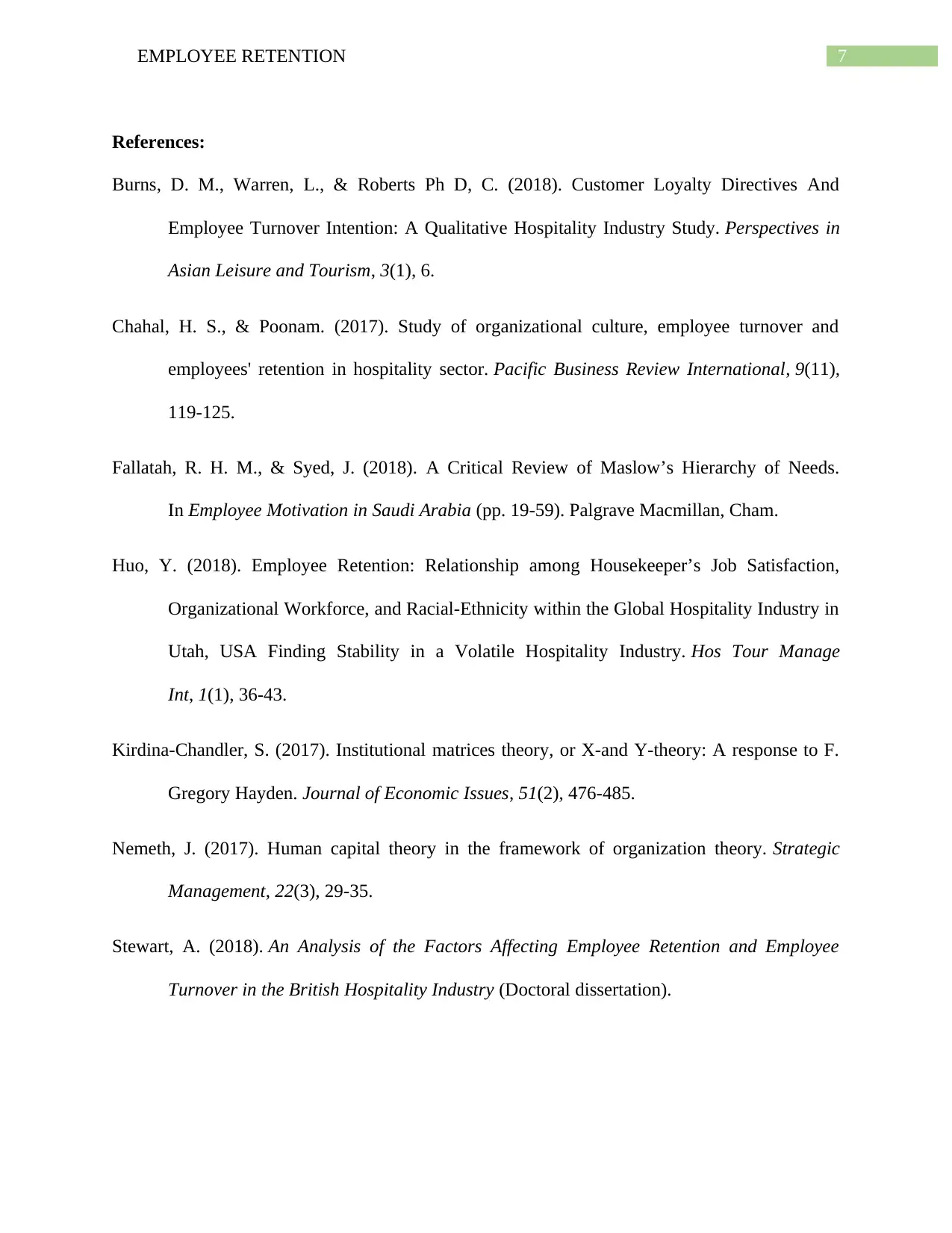
7EMPLOYEE RETENTION
References:
Burns, D. M., Warren, L., & Roberts Ph D, C. (2018). Customer Loyalty Directives And
Employee Turnover Intention: A Qualitative Hospitality Industry Study. Perspectives in
Asian Leisure and Tourism, 3(1), 6.
Chahal, H. S., & Poonam. (2017). Study of organizational culture, employee turnover and
employees' retention in hospitality sector. Pacific Business Review International, 9(11),
119-125.
Fallatah, R. H. M., & Syed, J. (2018). A Critical Review of Maslow’s Hierarchy of Needs.
In Employee Motivation in Saudi Arabia (pp. 19-59). Palgrave Macmillan, Cham.
Huo, Y. (2018). Employee Retention: Relationship among Housekeeper’s Job Satisfaction,
Organizational Workforce, and Racial-Ethnicity within the Global Hospitality Industry in
Utah, USA Finding Stability in a Volatile Hospitality Industry. Hos Tour Manage
Int, 1(1), 36-43.
Kirdina-Chandler, S. (2017). Institutional matrices theory, or X-and Y-theory: A response to F.
Gregory Hayden. Journal of Economic Issues, 51(2), 476-485.
Nemeth, J. (2017). Human capital theory in the framework of organization theory. Strategic
Management, 22(3), 29-35.
Stewart, A. (2018). An Analysis of the Factors Affecting Employee Retention and Employee
Turnover in the British Hospitality Industry (Doctoral dissertation).
References:
Burns, D. M., Warren, L., & Roberts Ph D, C. (2018). Customer Loyalty Directives And
Employee Turnover Intention: A Qualitative Hospitality Industry Study. Perspectives in
Asian Leisure and Tourism, 3(1), 6.
Chahal, H. S., & Poonam. (2017). Study of organizational culture, employee turnover and
employees' retention in hospitality sector. Pacific Business Review International, 9(11),
119-125.
Fallatah, R. H. M., & Syed, J. (2018). A Critical Review of Maslow’s Hierarchy of Needs.
In Employee Motivation in Saudi Arabia (pp. 19-59). Palgrave Macmillan, Cham.
Huo, Y. (2018). Employee Retention: Relationship among Housekeeper’s Job Satisfaction,
Organizational Workforce, and Racial-Ethnicity within the Global Hospitality Industry in
Utah, USA Finding Stability in a Volatile Hospitality Industry. Hos Tour Manage
Int, 1(1), 36-43.
Kirdina-Chandler, S. (2017). Institutional matrices theory, or X-and Y-theory: A response to F.
Gregory Hayden. Journal of Economic Issues, 51(2), 476-485.
Nemeth, J. (2017). Human capital theory in the framework of organization theory. Strategic
Management, 22(3), 29-35.
Stewart, A. (2018). An Analysis of the Factors Affecting Employee Retention and Employee
Turnover in the British Hospitality Industry (Doctoral dissertation).
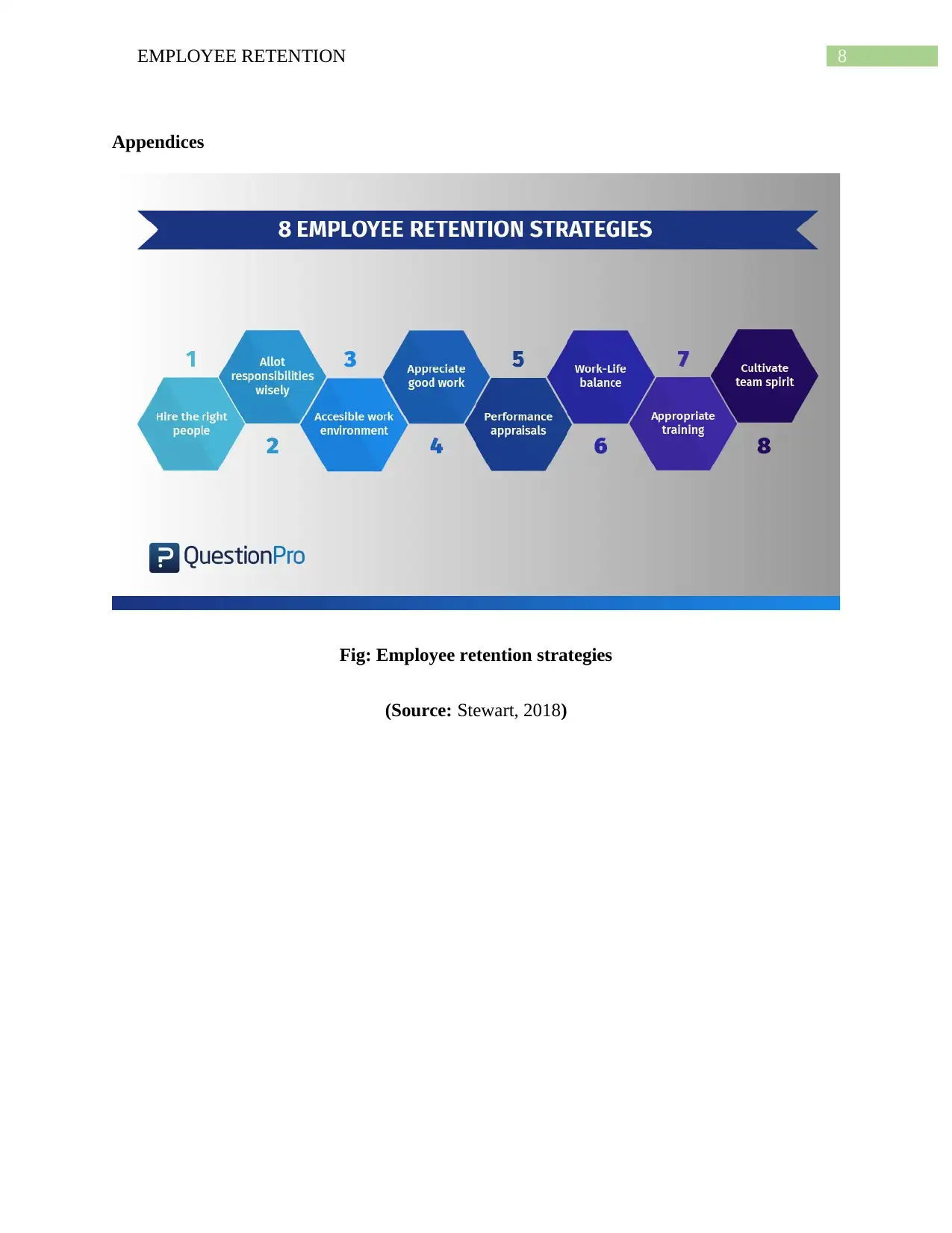
8EMPLOYEE RETENTION
Appendices
Fig: Employee retention strategies
(Source: Stewart, 2018)
Appendices
Fig: Employee retention strategies
(Source: Stewart, 2018)
⊘ This is a preview!⊘
Do you want full access?
Subscribe today to unlock all pages.

Trusted by 1+ million students worldwide
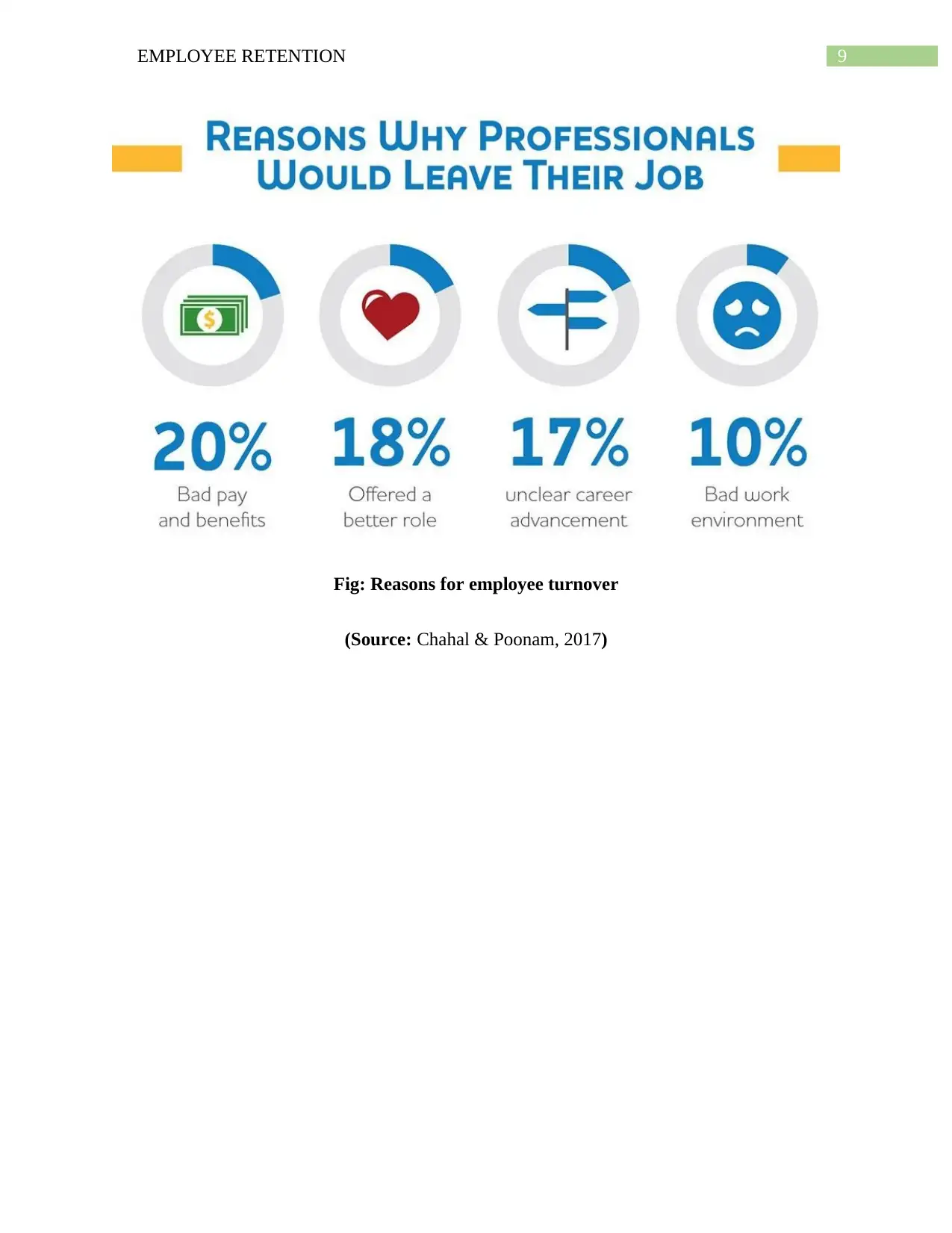
9EMPLOYEE RETENTION
Fig: Reasons for employee turnover
(Source: Chahal & Poonam, 2017)
Fig: Reasons for employee turnover
(Source: Chahal & Poonam, 2017)
1 out of 10
Related Documents
Your All-in-One AI-Powered Toolkit for Academic Success.
+13062052269
info@desklib.com
Available 24*7 on WhatsApp / Email
![[object Object]](/_next/static/media/star-bottom.7253800d.svg)
Unlock your academic potential
Copyright © 2020–2026 A2Z Services. All Rights Reserved. Developed and managed by ZUCOL.





